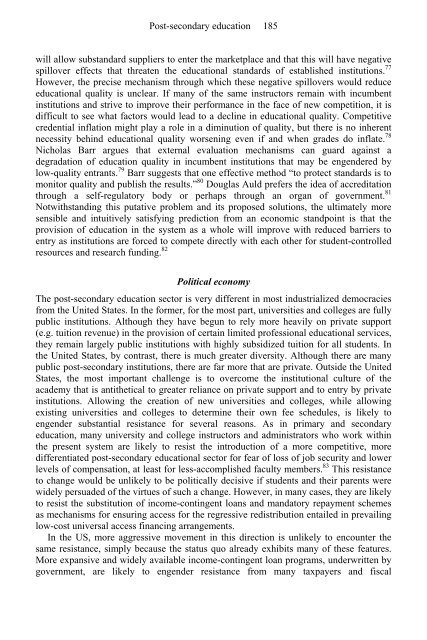Rethinking the Welfare State: The prospects for ... - e-Library
Rethinking the Welfare State: The prospects for ... - e-Library
Rethinking the Welfare State: The prospects for ... - e-Library
Create successful ePaper yourself
Turn your PDF publications into a flip-book with our unique Google optimized e-Paper software.
Post-secondary education 185<br />
will allow substandard suppliers to enter <strong>the</strong> marketplace and that this will have negative<br />
spillover effects that threaten <strong>the</strong> educational standards of established institutions. 77<br />
However, <strong>the</strong> precise mechanism through which <strong>the</strong>se negative spillovers would reduce<br />
educational quality is unclear. If many of <strong>the</strong> same instructors remain with incumbent<br />
institutions and strive to improve <strong>the</strong>ir per<strong>for</strong>mance in <strong>the</strong> face of new competition, it is<br />
difficult to see what factors would lead to a decline in educational quality. Competitive<br />
credential inflation might play a role in a diminution of quality, but <strong>the</strong>re is no inherent<br />
necessity behind educational quality worsening even if and when grades do inflate. 78<br />
Nicholas Barr argues that external evaluation mechanisms can guard against a<br />
degradation of education quality in incumbent institutions that may be engendered by<br />
low-quality entrants. 79 Barr suggests that one effective method “to protect standards is to<br />
monitor quality and publish <strong>the</strong> results.” 80 Douglas Auld prefers <strong>the</strong> idea of accreditation<br />
through a self-regulatory body or perhaps through an organ of government. 81<br />
Notwithstanding this putative problem and its proposed solutions, <strong>the</strong> ultimately more<br />
sensible and intuitively satisfying prediction from an economic standpoint is that <strong>the</strong><br />
provision of education in <strong>the</strong> system as a whole will improve with reduced barriers to<br />
entry as institutions are <strong>for</strong>ced to compete directly with each o<strong>the</strong>r <strong>for</strong> student-controlled<br />
resources and research funding. 82<br />
Political economy<br />
<strong>The</strong> post-secondary education sector is very different in most industrialized democracies<br />
from <strong>the</strong> United <strong>State</strong>s. In <strong>the</strong> <strong>for</strong>mer, <strong>for</strong> <strong>the</strong> most part, universities and colleges are fully<br />
public institutions. Although <strong>the</strong>y have begun to rely more heavily on private support<br />
(e.g. tuition revenue) in <strong>the</strong> provision of certain limited professional educational services,<br />
<strong>the</strong>y remain largely public institutions with highly subsidized tuition <strong>for</strong> all students. In<br />
<strong>the</strong> United <strong>State</strong>s, by contrast, <strong>the</strong>re is much greater diversity. Although <strong>the</strong>re are many<br />
public post-secondary institutions, <strong>the</strong>re are far more that are private. Outside <strong>the</strong> United<br />
<strong>State</strong>s, <strong>the</strong> most important challenge is to overcome <strong>the</strong> institutional culture of <strong>the</strong><br />
academy that is anti<strong>the</strong>tical to greater reliance on private support and to entry by private<br />
institutions. Allowing <strong>the</strong> creation of new universities and colleges, while allowing<br />
existing universities and colleges to determine <strong>the</strong>ir own fee schedules, is likely to<br />
engender substantial resistance <strong>for</strong> several reasons. As in primary and secondary<br />
education, many university and college instructors and administrators who work within<br />
<strong>the</strong> present system are likely to resist <strong>the</strong> introduction of a more competitive, more<br />
differentiated post-secondary educational sector <strong>for</strong> fear of loss of job security and lower<br />
levels of compensation, at least <strong>for</strong> less-accomplished faculty members. 83 This resistance<br />
to change would be unlikely to be politically decisive if students and <strong>the</strong>ir parents were<br />
widely persuaded of <strong>the</strong> virtues of such a change. However, in many cases, <strong>the</strong>y are likely<br />
to resist <strong>the</strong> substitution of income-contingent loans and mandatory repayment schemes<br />
as mechanisms <strong>for</strong> ensuring access <strong>for</strong> <strong>the</strong> regressive redistribution entailed in prevailing<br />
low-cost universal access financing arrangements.<br />
In <strong>the</strong> US, more aggressive movement in this direction is unlikely to encounter <strong>the</strong><br />
same resistance, simply because <strong>the</strong> status quo already exhibits many of <strong>the</strong>se features.<br />
More expansive and widely available income-contingent loan programs, underwritten by<br />
government, are likely to engender resistance from many taxpayers and fiscal


